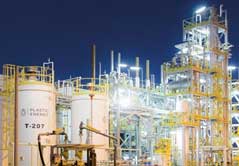Recycling: Ineos and Plastic Energy to set up recycling facility; BASF and Security Matters to work on tracking of recycled material

Chemical firm Ineos and Plastic Energy are to collaborate on the construction of a new plant to convert waste plastic into the raw material to make new plastic. Production of the new facility would be targeted for the end of 2023.
Advanced recycling technology converts waste plastic back to its basic molecules. The resulting material is then used in Ineos’s crackers to replace traditional raw materials derived from oil.
First trials of product from Plastic Energy’s current advanced recycling process have been completed. The new raw material has been successfully converted into virgin polymer through the Ineos cracker at Köln, Germany. The plastics made from this trial will now be used by selected customers and brands to demonstrate the benefits of the process.
Plastic Energy’s patented technology called Thermal Anaerobic Conversion (TAC) transforms previously unrecyclable plastic waste into Tacoil. This new recycled raw material could be used by many Ineos sites to produce virgin plastic for use across medical products, food packaging, lightweight automotive parts and pipes for safe water transportation.
Advanced recycling makes it possible to produce final product with an identical specification to virgin material. It removes all contamination so that the resulting polymers can be used in food and medical packaging, where safety standards require the highest level of product purity.

Meanwhile in other news, Australia’s Security Matters and German chemical firm BASF are to develop solutions for plastics traceability and circularity. With the move towards a circular economy, more plastic waste needs to be recovered and reused. Though there is great progress towards chemical recycling, the more common method is to mechanically recycle plastic. Currently, recycled plastic loses its mechanical performance properties and quality compared to virgin plastic due to polymer degradation and residual impurities. The recycling infrastructure is also expensive and complicated, and simply does not exist in many parts of the world.
In their cooperation, Security Matters and BASF aim to offer a solution for this. Security Matters will contribute its technology to enable physical and digital tracking of closed loop recycling, authenticate sustainability claims and improve sorting of plastic waste. The partnership leverages BASF’s extensive experience in plastic additives, regulatory know-how, and understanding of the plastics value chain. Both companies will also combine their research & development capabilities and required resources as part of the agreement.
Security Matters will provide its track and trace solution that marks physical objects with an unalterable chemical-based barcode and connects them to a digital twin. The barcode withstands manufacturing and recycling processes, without altering the appearance or performance of the object. Using proprietary technology, the barcode captures a wide variety of information embedded in the plastic and can be used for closing the plastic loop.
“To tackle the global challenge, we have to rethink plastic applications with their end of life in mind. It is essential to progress towards a circular economy approach that closes the loop on end-of-life resources and allows us to recover and recycle plastics as efficiently as possible,” said Achim Sties, Senior Vice President, Performance Chemicals Europe, BASF SE. “We are jointly developing this game-changing technology that could capture information of the polymer and how the plastic moves through the entire production and distribution process. We will be able to devise an appropriate additive package for our customers and other players in the value chain using recycled material to capture more material value and increase resource productivity.”
“This collaboration is the first step in demonstrating how our technology can be used in a circular application. By providing transparency of product lifecycles, we can create an entire technology-driven ecosystem that promotes circularity and sustainability for plastics. Together we can accelerate the progress of the plastic industry towards a more innovative, resilient and productive economy,” said Haggai Alon, Founder/CEO of Security Matters.
(PRA)
Subscribe to Get the Latest Updates from PRA Please click here
©2020 Plastics and Rubber Asia. All rights reserved.

©2020 Plastics and Rubber Asia. All rights reserved.
Home Terms & Conditions Privacy Policy Webmail Site Map About Us

















